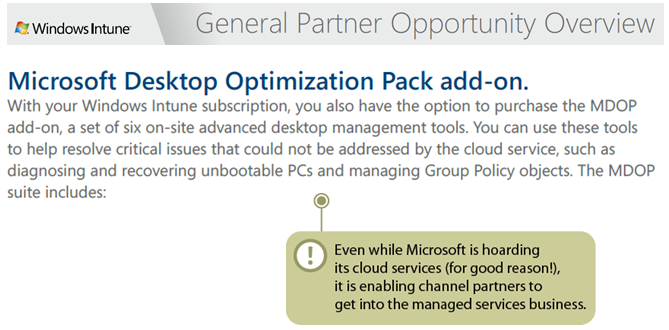Channel Enablement In The Era Of Cloud: One Of Microsoft’s Approaches
A lot of tech vendors – and channel partners – are struggling over what channel partners’ play in the cloud services demand chain is going to be. Technology is decreasingly delivered/consumed in the form of on-premise installation (a function performed by and the original raison d’être of channel partners), and increasingly delivered as-a-service by a service provider. In the software sector, that service provider is typically (but not always) the software vendor (think: salesforce.com).
And, in most cases, for good reason. Software has bugs. Early versions of software can be unstable and unpredictable. In the classic channel-partner-sells-and-installs-software model, the product (the software) remains in the control of the software vendor, i.e., the vendor assumes the risk of customers’ unmet expectations. The license is between the vendor and the customer, and the vendor is on the hook for providing bug fixes and tier-2 and -3 support.
As much as many channel partners would like to act as application hosters (and many of them do – approximately 15% of software is delivered via a hosting model today, and 20% of channel partners today have a hosting business [see “Channel Models In The Era Of Cloud”]), when it comes to early-version or mission-critical software, vendors simply can’t risk putting the as-a-service service level/performance responsibility in the hands of channel partners. Service failures, over which the vendor would have no control, would result in egg (or worse!) on the vendor’s brand, not the channel partner’s. Until tech vendors’ partner programs mature to the point where they can certify partners’ data centers, those vendors are going to be reticent to hand over the data center reins to partners.
So, with respect to cloud-based offerings, what’s a vendor to do with its channel partners – particularly vendors like Cisco and Microsoft, for which their channel partners constitute a great deal of their market strength? You can’t just turn your channel partners off.
Microsoft seems to be taking an experimental approach to cloud channels – “experimental” in that its channel strategy differs for each of its cloud offerings: Microsoft Dynamics CRM Online, Microsoft Office 365, Microsoft Azure, and Microsoft Windows InTune. But, per the last, Windows InTune (released last week), Microsoft is doing something brilliant from a partner-enablement perspective – while Microsoft owns and operates the data center behind InTune (a SaaS-based PC management and security solution), it is offering its channel partners an advanced management tool kit (Microsoft Desktop Optimization Pack) upon which they can build a viable managed services business in support of InTune.

Software vendors of all ilks would be well advised to heed Microsoft’s example. Virtually all software has some element of systems administration function, whether it be user provisioning, application security, or policy management. To carve this function off and offer it to your channel partners as a managed services building block will go a long way to maintaining and even enhancing, not just your partners’ loyalty, but their revenue production as well.